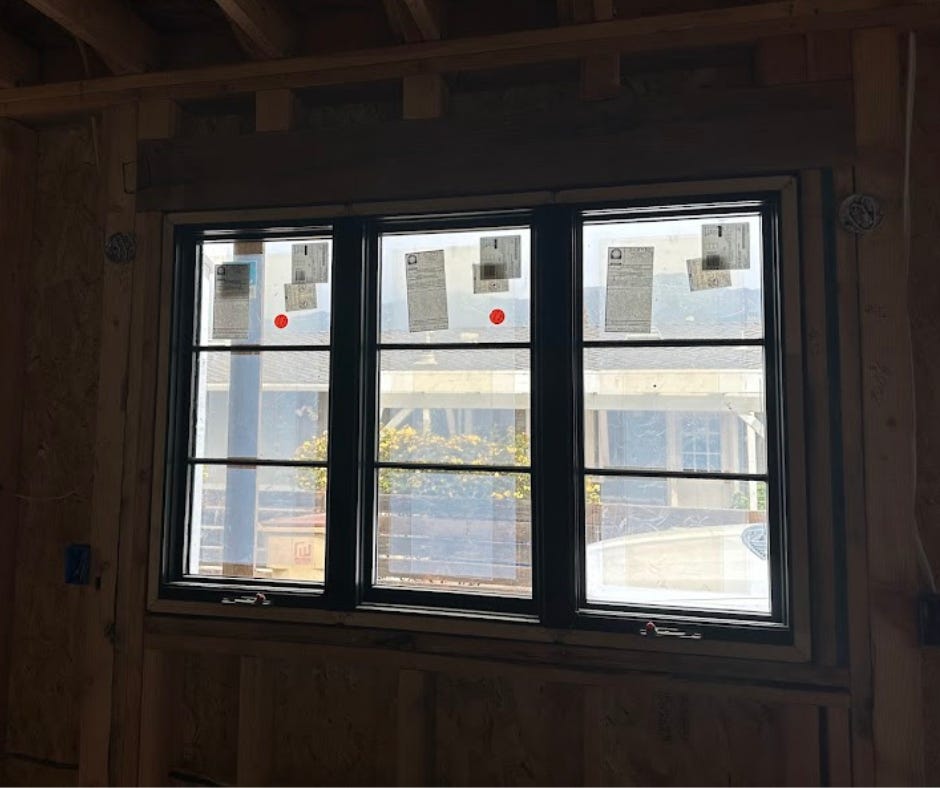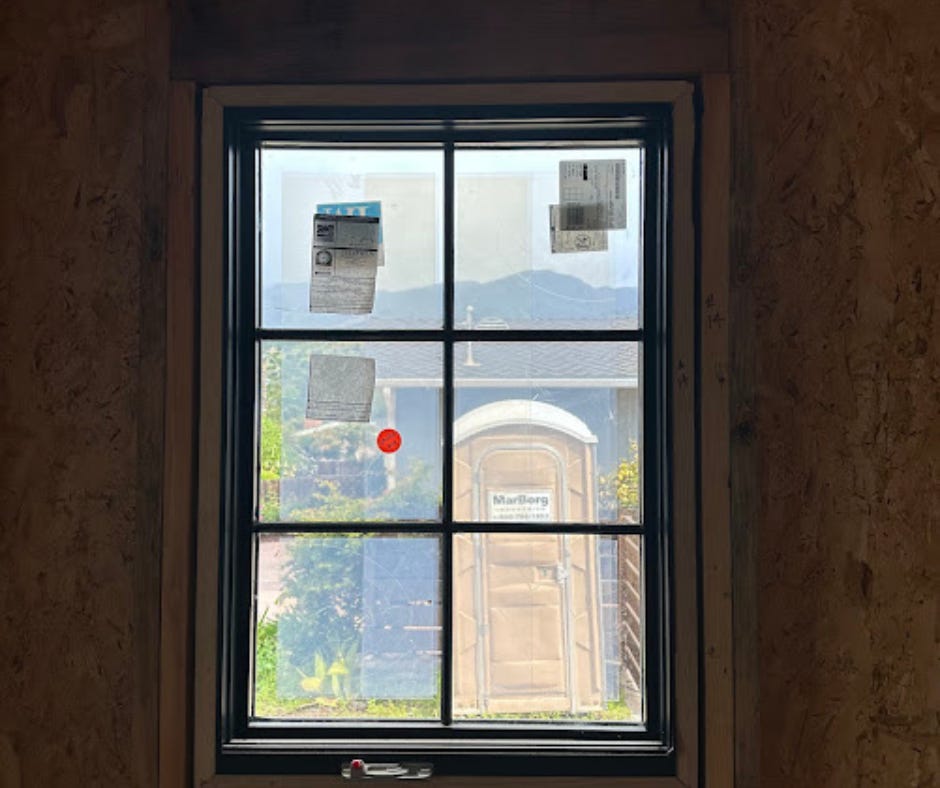Welcome to another installment of Loss + Finding Home, a real-time flash memoir of the complete gut and remodel of our 1950s California ranch-style home. Answering the questions: What does it mean to be home? Who makes up a home? How do you build a home when someone is always missing from the dinner table?
Previously, on Loss + Finding Home, I talked about the roof and rain and how babies are like the weather. Today, I want to talk about windows, poetry, and big eyes.
Part I: Windows
Of all our design choices, Nick and I spent the most time considering the windows.
We thought a lot about the holes we’d cut into the walls. We considered the shape of the glass and the cut of the mullions. We considered view, privacy, and even how the sun would rise and set from every angle.
We chose a window over a walk-in pantry in the kitchen.
And a window over a library wall in my office.
We wanted natural light in the bathroom.
And at the end of a dark hallway.
Windows were the main driver of everything and it's just now dawned on me that maybe we were searching for light after such a dark time.
Nick, being the construction guy, thought more about insulation and quality. He was particularly concerned with how screens might clutter up the clean framing and clear glass.
I was more focused on what I would see on the other side of the glass. How would these windows affect the way I watched my kids play in the yard? How will the San Marcos Foothills call to me from my kitchen, or how might I procrastinate while writing my memoir?
On paper, it was hard to visualize these things, but since the windows went in a few weeks ago, the conceptual is now tangible.
This forever home is a hard-earned dream come true, twelve years in the making. But no matter how much joy and satisfaction we get from this process, no matter how happy we are with the eventual result, one very important member of our family will always be missing.
It is the very definition of Bittersweet.
Part II: Poetry
April is National Poetry Month.
I didn’t think I knew this, but when I read about it on Modern Mrs Darcy a few years ago, I was flooded with memories of elementary school. Metaphors about rain, budding flowers, and renewal came to mind, and I thought about the simple lessons on couplets, acrostics, and Haiku.
I guess April just feels poetic in the same way October feels spooky.
Last week, on the drive to school my daughter, who’s in 5th grade, quizzed me,
“What’s a paragraph in a poem called?”
“A stanza,” I said, and I think she was impressed I had an answer, but when she asked if I knew a lot about poetry, I had to admit, “I know enough to get by.”1
I think about the lines, poems, and poets that infiltrate my inner world. I often ask myself, “What will I do with my one wild and precious life?” Or when I see a disturbing story on the news, I wonder, “What happens to a dream deferred?”
I like poetry, but I know I overthink it. I work too hard to understand what the poet is trying to say and often miss the experience. Over the years, I’ve tried to make poetry a less intimidating part of my reading life.
In 2021, the kids and I wrote Haikus.2 Then, cut out letters from magazines and pasted them into newspaper “ransom note” style.
I worked on my magazine art long after the kids lost interest. I liked it so much that I put it in a frame, and it will hang in Tatum’s new room.
Henderson Babies Big eyes, chubby hands, Round belies, kind joyful hearts. Happy, Safe, and Loved.
Part III: Eyes
“I could pick one of your babies out of a lineup,” People said to me after Aiden was born. I think after the third one, people start to notice a pattern.
“They’ve got those Henderson eyes,” they said and if I were a peacock, I would have shown my feathers.
Both Owen and Aiden have Nick's blue eyes, and Peyton’s are a color I can’t quite describe.
When Tatum was born so many people said, “She has her own look,” But I think that’s just because they forgot that I have brown eyes… I think even I forgot I have brown eyes.
But it’s not the color that that is so distinctive in my baby’s eyes; it’s the shape, big and round.
When Aiden was in the PICU, sedated after his first surgery we had a nurse named Lauren. Actually, we had three nurses named Lauren. This Lauren, whom we called Pregnant Lauren, took a special liking to Aiden.
Nick was sleeping at a friend’s house in L.A., and I was staying overnight. She and I stood at the crib just looking at him. “He’s so sweet,” she said to me. “Wait till you see his eyes,” I said. And then we were quiet for a while.
That was when we were still hopeful that this would just be a setback, that he would get better, and that we could put all of this behind us.
But then there was a diagnosis, and chemo, and a lung infection, and in one shocking moment, during a surgery that was risky, but his only chance at beating the beast that doesn’t play fair, he was gone.
They say that the eyes are the window to the soul and I believe that to be true.
Just before Nick and I left the hospital, after we cried, hugged, apologized, and showered all the love we could, I sat on the bed with Aiden. I got real close to his face and I thought of all the songs, tickle fests, and games of peek-a-boo that ended with me nuzzling my face into his neck and cheeks. I was so close to his eyes that I felt like I was inside them.
I wanted one more look into his eyes.
I gently lifted one lid. I don’t know what I expected, but I was relieved to see that they were the same deep blue they had always been. I wanted to drink in every fleck of navy, cobalt, periwinkle, and pale blue. I wanted to imprint that color on my heart so that I could keep it forever. And I did, but I also knew that his soul was already gone.
I could no longer look into his eyes, I could only look at them.
I realize now that it is not the color of the eye that is the window to one’s soul, but the deep black hole that is the pupil. Aiden’s eyes were big and blue, but his pupils were a tiny pinprick in the center of that ocean, never to be opened again.
I wish I had a hopeful, uplifting, universal-type truth to leave you with, but death often leaves you with more questions than answers… kind of like poetry.
I might say something about windows and how I’m not as interested in the actual physical window itself but how the things on either side of the glass interact with each other…
Or I might say something about eyes and taking the time to truly see people by looking into them and not just at them…
Maybe I could just leave both in and you can decide what speaks to you…
Because that’s poetry.

Terribly Painful Round-as-dinner-plate, deep-as-ocean Eyes. All holding each other in one image suspended In disbelief, long enough to feel real.
Like how I used enjambment there.
This is where I am today. Thank you for listening.
Emily
Coming up… I want to talk about guts.
Linkspo
Brave New Voices poetry slam!
is always sharing great poetry and short essays on his substackAlexi Pappas, Olympic runner, movie maker, and generally awesome. Wrote a very moving memoir titled, Bravey.
Powerful poem about teachers
Good lord, Kate Baer! Three very powerful poems.
A thought I can’t let go, but also can’t seem to make work...
One of the definitions of a stanza is, “a room”
According to California building code, a legal bedroom must have a door and some form of egress or window in case of emergency.
A window jamb is the main vertical part forming the sides of a window frame.
Enjambment is the continuation of a sentence without a pause beyond the end of a line.
In written poems, stanzas are separated by whitespace.
So when I stretch my metaphor, stanzas are rooms; to be a room, you have to have a window. Eyes are the windows to the soul. The whitespace in between stanzas is a hallway carrying the reader from room to room… and somewhere in there is poetry.
from Poets.org “The word stanza means “room” in Italian— “a station,” “a stopping place”—and each stanza in a poem is like a room in a house, a lyric dwelling place.”
from SDHouseGuys “A window, or [egress], is required for any legal bedroom in California…Windows in bedrooms must be big enough for an adult to climb through in case of an emergency.”
from Poets.org “In written poems, stanzas are separated by white space, and this division on the printed page gives the poem a particular visual reality. The reader has to cross a space to get from one stanza to another.”













Your eyes are windows
that everywhere see the love
that was, is, will be
Emily, my friend, this is heart achingly beautiful— just like those round eyes and that “ransom styled” poem. I’m always grateful for openness and how you write your people with such love. It is a privilege to read your words 🤍🤍🤍